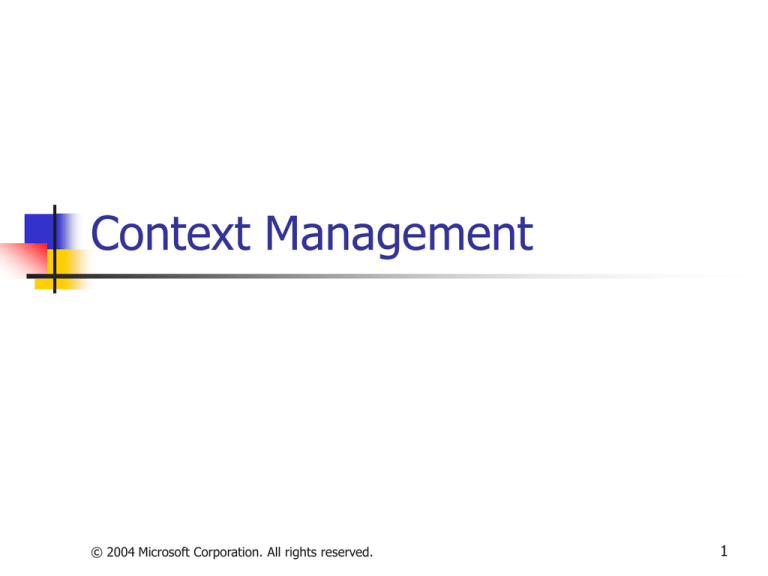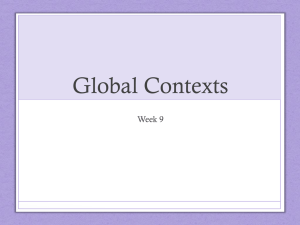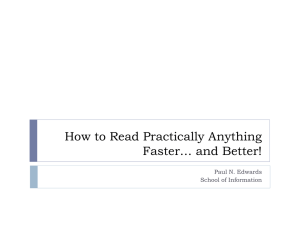
Context Management
© 2004 Microsoft Corporation. All rights reserved.
1
What are Contexts?
Minifilter defined memory associated with Filter Manager objects
Which objects can have contexts:
May be from Paged or Non-paged pool
Volume
Instance
File (not currently supported)
Stream
StreamHandle (FileObject)
Filter Manager tracks when contexts should be deleted:
Object deletion
Instance detach
Filter unload
© 2004 Microsoft Corporation. All rights reserved.
2
Contexts and 3rd party file
systems
To support Stream and StreamHandle
contexts a file system must use the
FSRTL_ADVANCED_FCB_HEADER
See FsRtlSetupAdvancedHeader() and
FsRtlTeardownPerStreamContexts() in
NTIFS.H
Also look at the FastFat source in the IFSKit
All Microsoft file systems now use this
© 2004 Microsoft Corporation. All rights reserved.
3
Context Registration
Specify an array of FLT_CONTEXT_REGISTRATION structures
in FLT_REGISTRATION structure
The order of the entries in this array does not matter
At least one registration entry must be specified for each
context type used by the filter
CleanupContext() callback is optional
3 different allocation options:
Specify 0-3 explicit context sizes (for given context type). System
internally uses Lookaside lists
Specify FLT_VARIABLE_SIZED_CONTEXTS, system allocates
directly from pool (may be used in conjunction with explicit sizes)
Pool tag must be specified
Pool tag must be specified
Specify your own allocate/free callback routines
© 2004 Microsoft Corporation. All rights reserved.
4
Creating Contexts
Use:
NTSTATUS
FltAllocateContext (
IN PFLT_FILTER Filter,
IN FLT_CONTEXT_TYPE ContextType,
IN SIZE_T ContextSize,
IN POOL_TYPE PoolType,
OUT PFLT_CONTEXT *ReturnedContext);
Volume contexts must be allocated from non-paged
pool
Contexts limited to 64K in size
A context size of zero is supported
© 2004 Microsoft Corporation. All rights reserved.
5
Setting contexts
Use:
FltSetVolumeContext()
FltSetInstanceContext()
FltSetFileContext()
FltSetStreamContext()
FltSetStreamHandleContext()
Sample:
NTSTATUS
FltSetStreamHandleContext (
IN PFLT_INSTANCE Instance,
IN PFILE_OBJECT FileObject,
IN FLT_SET_CONTEXT_OPERATION Operation,
IN PFLT_CONTEXT NewContext,
OUT PFLT_CONTEXT *OldContext OPTIONAL);
FLT_SET_CONTEXT_OPERATION values:
FLT_SET_CONTEXT_REPLACE_IF_EXISTS
FLT_SET_CONTEXT_KEEP_IF_EXISTS
If specified, replaced context returned in OldContext parameter (must be dereferenced)
If specified, existing context returned in OldContext parameter (must be dereferenced)
Can not set contexts at DPC level
© 2004 Microsoft Corporation. All rights reserved.
6
Supports contexts
Use:
BOOLEAN
FltSupportsFileContexts (
IN PFILE_OBJECT FileObject);
BOOLEAN
FltSupportsStreamContexts (
IN PFILE_OBJECT FileObject);
BOOLEAN
FltSupportsStreamHandleContexts (
IN PFILE_OBJECT FileObject);
Checks to see if contexts are supported on the given FileObject
Not supported on paging files
Not supported during pre-create
Not supported during post-close
Not supported during IRP_MJ_NETWORK_QUERY_OPEN
FltSupportsFileContexts() currently returns FALSE
Not supported on file systems that do not use the FSRTL_ADVANCED_FCB_HEADER
© 2004 Microsoft Corporation. All rights reserved.
7
Getting Contexts
Use:
FltGetVolumeContext()
FltGetInstanceContext()
FltGetFileContext()
FltGetStreamContext()
FltGetStreamHandleContext()
Sample:
NTSTATUS
FltGetStreamContext (
IN PFLT_INSTANCE Instance,
IN PFILE_OBJECT FileObject,
OUT PFLT_CONTEXT *Context);
Designed to be retrieved during each operation
Can not get contexts at DPC level – if a context is needed in a postOperation
callback:
Get it during the preOperation callback and pass it to the postOperation callback
Do your postOperation processing at non-DPC level
Synchronize operation
Use FltDoCompletionProcessingWhenSafe()
© 2004 Microsoft Corporation. All rights reserved.
8
Referencing Contexts
Use:
VOID
FltReferenceContext(
IN PFLT_CONTEXT Context);
This allows a filter to add their own
reference to a context
Call FltReleaseContext() to remove
added reference
© 2004 Microsoft Corporation. All rights reserved.
9
Releasing Contexts
Use:
VOID
FltReleaseContext (
IN PFLT_CONTEXT Context);
Contexts need to be released following:
Contexts may be held from pre to post operations as well as across
multiple operations
They must eventually be released or the memory will be leaked
It is OK for a context to point to another context
Getting (via FltGetXxxContext())
Creating (Via FltAllocateContext())
Referencing (via FltReferenceContext())
A replaced or previous context returned from FltSetXxxContext()
routines
Example: stream context contains a pointer to an instance context
Contexts can be released at DPC level
© 2004 Microsoft Corporation. All rights reserved.
10
Multiple contexts
Use:
VOID
FltGetContexts (
IN PFLT_RELATED_OBJECTS FltObjects,
IN FLT_CONTEXT_TYPE DesiredContexts,
OUT PFLT_RELATED_CONTEXTS Contexts);
VOID
FltReleaseContexts (
IN OUT PFLT_RELATED_CONTEXTS Contexts);
© 2004 Microsoft Corporation. All rights reserved.
11
Deleting Contexts
Use:
FltDeleteContext()
FltDeleteVolumeContext()
FltDeleteInstanceContext()
FltDeleteFileContext()
FltDeleteStreamContext()
FltDeleteStreamHandleContext()
Sample:
VOID
FltDeleteContext (
IN PFLT_CONTEXT Context);
NTSTATUS
FltDeleteVolumeContext (
IN PFLT_FILTER Filter,
IN PFLT_VOLUME Volume,
OUT PFLT_CONTEXT *OldContext OPTIONAL);
Only use if you have an explicit reason to delete an existing context
Filter Manager tracks when contexts should be deleted due to objects going away
Can not delete contexts at DPC level
© 2004 Microsoft Corporation. All rights reserved.
12
Freeing Contexts
Contexts are freed after they are deleted and all outstanding
references have been released
PFLT_CONTEXT_CLEANUP_CALLBACK
Unique routine defined for each context type at registration time
May be NULL if you don’t have any cleanup work to do when
context is freed
Called by Filter Manager before context is freed
Contexts are cleaned up in the following hierarchical order
StreamHandle
Stream
File (when implemented)
Instance
Volume
© 2004 Microsoft Corporation. All rights reserved.
13
Example: Setting a stream
context
status = FltAllocateContext( FilterHandle,
FLT_STREAM_CONTEXT,
sizeof(NCONTEXT),
PagedPool,
&ctx );
if (NT_SUCCESS(status)) {
/* Initialize Context Here */
status = FltSetStreamContext( FltObjects->Instance,
FltObjects->FileObject,
FLT_KEEP_CONTEXT_IF_EXISTS,
ctx,
NULL );
/ * Always release. If set fails it will free it */
FltReleaseContext( ctx );
}
© 2004 Microsoft Corporation. All rights reserved.
14
Performance Suggestions
If a filter only supports one instance per
volume (which most filters do) use
instance contexts instead of volume
contexts
Consider putting a pointer to your
instance context inside your stream or
streamhandle contexts
© 2004 Microsoft Corporation. All rights reserved.
15
Sample
Look at Ctx minifilter sample
© 2004 Microsoft Corporation. All rights reserved.
16









